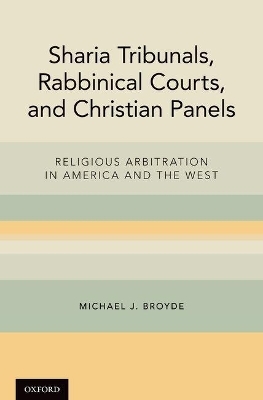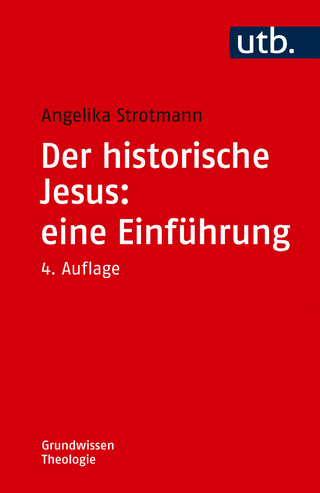
Sharia Tribunals, Rabbinical Courts, and Christian Panels
Oxford University Press Inc (Verlag)
978-0-19-064028-6 (ISBN)
Michael J. Broyde is a law professor at Emory University School of Law, and a senior fellow at Emory University's Center for the Study of Law and Religion. His areas of specialty are law and religion, Jewish law and ethics, and comparative religious law. Professor Broyde has also taught Federal Courts, Alternative Dispute Resolution, and Secured Credit and Bankruptcy. Broyde is also a rabbi and served as the director of, and a judge in, the Beth Din of America, the largest Jewish law court in the United States.
Preface: Why a Book About Religious Arbitration
Acknowledgments
Introduction: Changing Values and Laws
Part I
Chapter One: The Rise of Religious Arbitration
A. Customizing Law: The Development of Religious Arbitration
B. A Brief History of Arbitration's Rise in the United States
C. The Birth of Religious Arbitration
D. Variants of Religious Arbitration in Practice
Jewish Arbitration
Protestant Christian Arbitration
Catholic Christian Arbitration
Islamic Arbitration
E. The Future of Religious Arbitration
F. Crafting a Framework for Enforceable Arbitration Decisions
G. Religious Arbitration's Biggest Challenges Moving Forward: Molding Ancient Laws to Fit a Modern Paradigm & Equal Access of All Religions to Religious Arbitration
H. Conclusion
Chapter Two: The Movement Away from Secular Values in the Religious Community
The Settling Dust of the Culture Wars
Cultural and Moral Shifts in the United States
Movement Away from Religion and Religious Mores in the United States
Examples of Changing Values
Religious Groups Taking Back Control Over Marriage
The Rise of Religious Communities as a Centerpiece
Conclusion
Chapter Three: Co-religionist Commerce is Better Adjudicated in Arbitration
A. Co-Religionist Commerce and Contextual Adjudication
B. The Strength of Industry and Co-Religionist Arbitration
C. The Special Language of Industries and the Special Language of Co-Religionist Commerce
D. Co-Religionist Disputes in Secular Courts
Co-religionist Family Law Disputes and the Secular Courts
Co-religionist Commercial Disputes and the Secular Courts
Part II
Chapter Four: A History of Religious Arbitration
A. Historical Foundations of Religious Arbitration
B. Religious Arbitration in America
Conclusion
Chapter Five: Arbitration Law and its Evolution
A. Introduction: Why Care About the Parameters of Arbitration Generally?
B. A History of Arbitration Law in America
C. The Development and Evolution of ADR in the United States
Conciliation
Mediation
Arbitration
Conclusion
Part III
Chapter Six: Regulation of Arbitration Law in the United States
A. The Arbitration Agreement
B. The Arbitration Process
C. Unconcionability and Duress
Unconscionability in Commercial Arbitration
Unconscionability in Family Law and Policy
Conclusion
Chapter Seven: Refining Religious Arbitration in the United States and Abroad: The Jewish Experience
A. Jewish Arbitration Today
B. The Pillars of Successful Religious Arbitration in America
1. Publication of Formal, Sophisticated Rules of Procedure
2. Development of an Internal Appellate Process
3. Respect for Both Religious and Secular Legal Norms
4. Acknowledgement of Commercial Customs and General Equity
5. Reliance on Arbitrators with Broad Dual-System Expertise
6. Assumption of an Active Role in Internal Communal Governance and External Communal Representation
Conclusion
Chapter Eight: Refining Religious Arbitration in the United States and Abroad: The Muslim and Christian Experience
A. The Challenge of Islamic Arbitration in America
B. Islamic Arbitration in the United Kingdom: The Muslim Arbitration Tribunal Model
C. Islamic Arbitration in the United States
D. Christian Dispute Resolution in America
Conclusion
Part IV
Chapter Nine: The Case against Religious Arbitration
Introduction
One Law for One People
Religious Arbitration Produces Substantive Injustice
Religious Arbitration Produces Procedural Injustice
Religious Arbitration is Often Coercive and is Used to Entrench Unjust Power Relations in Religious Communities
Religious Arbitration Cannot Be Adequately Policed or Regulated in Liberal Societies Committed to Religious Freedom
Secular Enforcement of Religious Arbitration Violates Disputants' Rights to Freedom of Religion
Secular Recognition of Religious Arbitration Promotes Isolation and Non-Integration Among Religious Communities
Chapter Ten: Religious Arbitration as a Secular Value: The Case for Religious Arbitration
A. Recognizing Religious Arbitration is a Religious Freedom Imperative
B. Religious Arbitration Often Resolves Disputes Better than Secular Adjudication
C. Religious Arbitration is Necessary for Resolving Religious Problems
D. Secular Recognition of Religious Arbitration Helps Moderate and Integrate Religion
E. Secular Recognition of Religious Arbitration Promotes Value Sharing that Enriches Public Policy and Discourse
Conclusion
Chapter Eleven: Concluding Thoughts
Index
| Erscheinungsdatum | 07.07.2017 |
|---|---|
| Verlagsort | New York |
| Sprache | englisch |
| Maße | 231 x 155 mm |
| Gewicht | 454 g |
| Themenwelt | Geisteswissenschaften ► Religion / Theologie ► Christentum |
| Geisteswissenschaften ► Religion / Theologie ► Judentum | |
| Geisteswissenschaften ► Religion / Theologie ► Islam | |
| Recht / Steuern ► Allgemeines / Lexika | |
| Recht / Steuern ► EU / Internationales Recht | |
| ISBN-10 | 0-19-064028-6 / 0190640286 |
| ISBN-13 | 978-0-19-064028-6 / 9780190640286 |
| Zustand | Neuware |
| Informationen gemäß Produktsicherheitsverordnung (GPSR) | |
| Haben Sie eine Frage zum Produkt? |
aus dem Bereich


